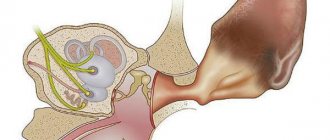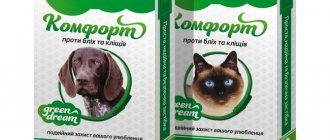An effective remedy for ticks and fleas is selected individually. How to protect a cat, each owner decides for himself. Often this decision is the choice of the lesser evil: fleas and ticks are dangerous, but protective drugs also have some toxic effect. How to make the best choice? First of all, let's say a few words about why cats need protection from ticks and fleas. Many people think that there is nothing wrong with bites. Well, it’s scratched - and what’s next? And then the most interesting part.
The article is part of the section Ticks in cats and dogs
- There can be an allergic reaction to a flea or tick bite. Sometimes this reaction is only mild itching, and sometimes dermatitis, an inflammatory skin disease, can develop. This is a very painful condition that is not always easy to overcome.
- Fleas and ticks can reward their victims with infections and worms. The types of dangerous parasites and infections that ticks and fleas infect vary depending on who is bitten. Some diseases develop in cats, others in dogs, and others in humans. It is these infections and parasites that are the main problem, not fleas and ticks themselves.
- Extensive flea bites can cause death in young kittens, as well as poor weight gain and anemia in growing animals.
- Ticks and fleas, having fed on the cat's blood, can spread to another family member, for example, to your child. Therefore, by protecting your cat from ticks and fleas, you are protecting your entire family.
Many people think that cats that stay indoors and never go out do not need protection. In fact, fleas are everywhere, even on the twentieth floor. Ticks can be brought into the house on clothing. Therefore, it is a mistake to believe that if a cat does not leave the house, it is completely protected. However, if you do not live in an apartment on the first floor and there are no fleas in your apartment, nor in your neighbors, nor on the landing, that is, everything is clean everywhere, then, indeed, you can try to do without protective equipment. At least in the cold season. But if there is even the slightest doubt (you have been bitten by a flea somewhere, your neighbors have a cat who goes outside, you also have a dog in the house, there are other risk factors), then it is better to protect the cat.
Article continues after advertisement
How to protect your cat from fleas and ticks: basic methods
A cat, especially an outdoor one, must be treated for parasites, even if they are not detected. Insecticidal preparations will repel pests from the animal. If the parasites do attack the cat, they will die as soon as they attach themselves to the pet. The effectiveness and duration of protection largely depends on the product with which the cat will be treated.
To help remove fleas from a cat at home:
- collars;
- drops;
- solutions;
- sprays;
- shampoos;
- powders/powders;
- pills;
- injections.
Flea and tick collar for cats
Collars for cats are primarily designed for fleas. Before purchasing, read the instructions to know exactly how the flea collar for cats works:
- Some models only repel insects.
- More advanced options kill parasites by distributing the active substance throughout the animal's body.
- Among the models, there are those that destroy only adult individuals, while others cope with parasites at earlier stages.
Important: Even the best flea collars for cats often cause allergies. If your pet wears it for a long time, but does not stop itching, remove the accessory and replace it with another drug.
Drops on the withers, solutions, sprays against fleas and ticks for cats
Sprays and drops against ticks for cats provide good protection. They contain an active substance that is distributed along the skin but does not enter the blood. The solution repels parasites, especially at first, while there is a smell. Then the aroma goes away, the pests attack the animal and die when they bite through the skin.
For the drug to have the desired effect, the pet should not be washed 3 days before and after treating cats for fleas and ticks. It is also important to apply it not to the fur, but to the skin of the cat. To prevent the animal from licking the solution, it should be dripped onto the withers.
The spray can be used to treat a cat's bedding against fleas and ticks. This way the pet will be more reliably protected.
Shampoos
Flea and tick shampoos for cats will help get rid of parasites, but they are effective for no longer than 3 days. But they can be used as comprehensive protection. For example, a cat can be washed with shampoo 4-5 days after treatment with tick drops for cats. The product will wash away dead parasites and soothe irritated skin.
Tablets and injections
Tablets boast the longest and most effective action. The price of flea treatment for cats is high, but justified. The tablets do not repel parasites, but cause paralysis as soon as they bite through the skin. After a few hours the pest dies. For this reason, the tick does not have time to release saliva into the bloodstream and infect the cat.
Important: never give cats tablets for dogs, even if you calculate the dosage correctly. Buy only medications designed specifically for cats.
Composition, release form and storage conditions
Aversectin ointment contains aversectin C, which has an effect against parasites. Additionally, the composition includes the following components:
- polyethylene oxide-1500;
- distilled glycerin;
- polyethylene oxide-400.
The ointment has a yellowish tint and a uniform consistency. There should be no foreign inclusions. The product is released only in the form of an ointment, which is placed in a polymer jar. The drug must be stored under certain temperature conditions: from 0 to 20 degrees. Otherwise, the composition will quickly become unusable. The ointment should not be near light sources. The medication should be stored in a dark place for no more than 2 years. After opening the drug, its shelf life is reduced to 24 days.
Aversectin ointment is used in veterinary practice
Attention! The medicine cannot be used after the expiration date. Otherwise, instead of benefit, you can cause harm to the animal.
How to protect your cat from fleas
Insects can end up on your pet, even if it has not been in contact with other cats. If the cat is outdoor, the parasite can jump onto the fur from the grass or asphalt. If the pet has never left the apartment, infection is possible from other pets (cat, dog) that are outdoors.
The Best Flea Treatments for Cats
To protect your cat, you can use drops, tablets, and shampoos. It is very important to regularly treat the bedding on which your pet sleeps with a flea spray for cats and wash it constantly.
Flea and tick collar for cats: which one is better?
Good results in protection against fleas and ticks were shown by:
- Beafar Flea & Tick collar;
- Preventeff Cat (Virbak);
- Foresto (Bayer/Elanco).
If you want the most effective flea treatment for cats, containing natural ingredients, buy collars from the Celandine series.
Anti-tick tablets for cats
The best protection for cats against fleas and ticks in the countryside is Inspector Quadro tablets. They protect the cat from parasites for 2 months.
Drops and sprays
The price of anti-tick drops for cats is cheaper than tablets, but they do not last as long - 2-3 weeks. According to reviews, the best flea drops for cats:
- Bravecto Spot On;
- Beafar;
- Inspector;
- Advocate;
- Frontline.
Shampoos
Among the shampoos, Bio from Beafar, Pchelodar from Agroprioprom, and Antiparasitic Celandine have proven themselves well. If you need a “2 in 1” product, you can buy a spray:
- Fiprist spray;
- Parastop from Virbak;
- Fiprex spray forte (Vetagro).
Powder
To protect against fleas, you can use a special powder / powder (Flicar, Ektosan, Insectal). This method is not popular, but this does not mean that it is bad. The powder is applied to dry fur, then rubbed into the skin. The powder is absorbed into the top layer of skin and protects against fleas.
How to protect your cat from ticks
To protect your cat from ticks, you can use the same products as against fleas, but more often. For example, if drops protect against fleas for 3 weeks, against ticks – for two.
Don't forget to examine your pet every time she comes home from the street. If you remove the parasite in time, the chance of avoiding infection increases significantly. Since the tick does not attach itself immediately, look not only for arthropods swollen with blood, but also for those that are only crawling along the fur.
The best tick repellents for cats
If your cat is always outdoors, give preference to Inspector Quadro tablets, which provide protection for 2 months. They help especially well if your pet has demodicosis. The pills do not completely cure the disease, but while they work, they reliably curb population growth.
Analogue tablets - injections (Ivermek), Eprimek, Lufenuron. They protect not only from insects, but also helminths. However, these are very strong drugs that have a toxic effect on the body. Therefore, veterinarians rarely prescribe them, in very severe cases.
If you are worried about safety, or are afraid of poisoning your cat, take Bravecto Spot On drops, Beakar. They provide good protection against ticks, but your pet will have to be treated every 2 weeks.
How to remove a tick
If you see a tick on a cat, do not panic and do not pull it out. If you remove it incorrectly, the parasite may have time to release saliva containing the infection into the blood. Also, its head will remain in the cat's body, which can lead to suppuration.
Veterinarians recommend using a special device to remove the parasite. If you don’t have it, you can use tweezers, or, as a last resort, eyebrow tweezers:
- Grasp the tick with tweezers as close to the skin as possible.
- Gently twist the forceps to gently pull out the parasite.
- Turn only one way. Do not loosen the tongs or pull the tick sharply upward. You can tear it, and part of the parasite will remain in the skin, or out of fear it will have time to inject saliva.
Checking the cat after a walk
Every time your cat returns home from the street, take the time to carefully examine her for the presence of parasites: thoroughly comb the animal’s fur with a thick comb, inspect the ear areas, paw pads, stomach, groin and armpits. Sometimes it is possible to find a bloodsucker that has not yet started the “meal” - in such cases the insect is immediately removed and burned. If the tick has already attached itself, remove it as soon as possible, thereby minimizing the risk of infection.
Of course, those cat lovers whose pets live inside the house and never go outside are least concerned about the problem of ticks. But this is not always possible, so if your four-legged friend loves long walks, do not limit his desires: just provide him with the most effective protection, and not a single tick will pose a danger to him! After all, our love and care can create real miracles. Health to you and your cats.
How to protect your kitten from fleas and ticks
Most products are intended for kittens from 8 weeks of age. Unless absolutely necessary, do not use insecticidal preparations that are not age appropriate. They contain strong ingredients that can be harmful.
If you find parasites, you must wash or change the bedding and wash the floor in the apartment using disinfectants. You can try combing fleas out of the fur, but the procedure will not bring much effect.
To protect your kitten you can use:
- from 2 days of age: Fipronil Spray;
- from 7 days: Fiprist Spray;
- from 1 month of age: Frontline spray;
- from 6 weeks: BEAFAR SOS collar.
Before purchasing a product, it is important to make sure that it is safe not only for the baby, but also for the mother. Apply flea and tick medication for cats only to areas specified in the instructions. By licking the kitten, the mother can lick off the solution.
How to protect a pregnant and nursing cat from fleas and ticks
Ideally, the animal should be treated before pregnancy. But flea treatments for cats on the withers last no more than a month; you will still have to use such a drug once.
It is highly undesirable to use tablets during pregnancy and lactation, as they can affect the formation of the internal organs of kittens. This must be taken into account, even if the manufacturer claims otherwise. It is better to take drops and sprays that are not absorbed into the blood.
As for nursing mothers, it is better not to treat them at all, since kittens can lick the spray from their fur. To protect your cat, simply do not let it out of the house, protect it from contact with other pets, and clean the apartment thoroughly.
How to Protect Your Older Cat from Fleas and Ticks
Flea and tick treatment for older cats should not be ignored. Over the years, immunity declines and succumbs to infections that the body used to cope with on its own - Lyme disease, encephalitis, dermatitis. Treatment is difficult, and an older pet can die.
The same products are suitable for treating an old cat as for a young cat. Instead of tablets and injections, it is better to use drops on the withers against ticks for cats. They are safe and do not harm internal organs, which is very important in old age, when many systems in the body fail.
When choosing the best tick repellent for cats, consider the following recommendations:
- Health. If your pet is weak, buy a tick collar for cats or drops.
- Allergy. Over the years, immunity declines, which can manifest itself as allergies. Change your cat's anti-tick medications if a reaction occurs to a product that previously had no problems. To get rid of the effects of allergies, give your cat a bath.
- Age. The older the cat, the gentler the effect on the body should be.
If you want to give a flea tablet to cats but are not sure, talk to your veterinarian. He will take blood tests and do allergy tests that will determine if it is safe to give flea medication to cats.
Side effects and contraindications
Adverse reactions when using the drug occur very rarely. Sometimes allergies may occur. In this case, it is enough to wash off the ointment under running warm water and give the cat an antihistamine. The medicine is not used for bacterial and viral infections in animals. The ointment is contraindicated in emaciated cats. The product should not be used during the animal’s recovery period.
The cat has a sore on his withers. Everyone was very scared and upset. The cat belongs to a friend of mine, to whom I suggested that she take her pet to the doctor. She decided to wait a little. As a result, the cat’s body weakened, but the sore began to go away on its own. After some time we decided to try this ointment. However, the doctor said that since the process of recovery has begun, it is best to let the cat get a little stronger and use the product in combination with vitamins. We are pleased with the result. But I do not recommend treating the animal yourself without first consulting a doctor!
Folk remedy for ticks and fleas for cats
In terms of effectiveness, folk remedies for fleas for cats are significantly inferior to insecticides, and are not always safe. For example, washing with gasoline or alcohol will not bring any benefit. They will only temporarily stun the parasites. When the pests wake up, they will continue to torment the cat.
If you still want to use traditional methods, try essential oils. To repel fleas, take wormwood oil, ticks - cedar. These aromas may frighten pests, but will have no effect if the parasites are too hungry (for example, in early spring).
Important: not all scents are suitable for cats. For example, orange repels fleas, but cats do not like them, just like any other citrus smell. The same goes for geranium, eucalyptus, and lavender.
Recommendations
To prevent your pet from becoming infected with fleas and ticks, follow these recommendations:
- Before treating your cat for fleas and ticks, read the instructions carefully.
- Follow the animal treatment schedule indicated in the instructions for the product you have chosen.
- Select the dosage based on the weight, age, and health of the animal.
- Regularly treat the bed where your pet sleeps with an anti-tick spray for cats.
- Vacuum frequently, paying special attention to areas where your pet likes to spend time. The vacuum cleaner bag can be treated with flea spray to kill live fleas or eggs that are sucked inside.
- Use only one product per treatment. The chemicals in different products don't always work well together and can be harmful to your kitten.
- A few days after using flea drops for cats, bathe your cat with shampoo to remove dead insects.
There are many insecticidal products on the market that effectively kill fleas and ticks. The main thing is not to buy the product secondhand, so as not to take a fake. Take drops, tablets, sprays only from veterinary pharmacies or pet stores.
Terms of use
So, as we have already said, antiparasitic drops are applied to the animal’s withers. First, you need to take the cat and use a comb or simply use your fingers to push the fur apart in the treated area. We drip the solution onto the body and gently but thoroughly rub it into the skin. After applying the product, the animal should not be bathed for three days.
On a note! Many manufacturers indicate in the instructions that after using the drops, the cat should not be stroked or combed in the treated area!
How much product will be needed for one treatment? This depends on your pet’s age, body weight, health status and other individual characteristics. You will again find information on dosage for each specific case in the instructions.










